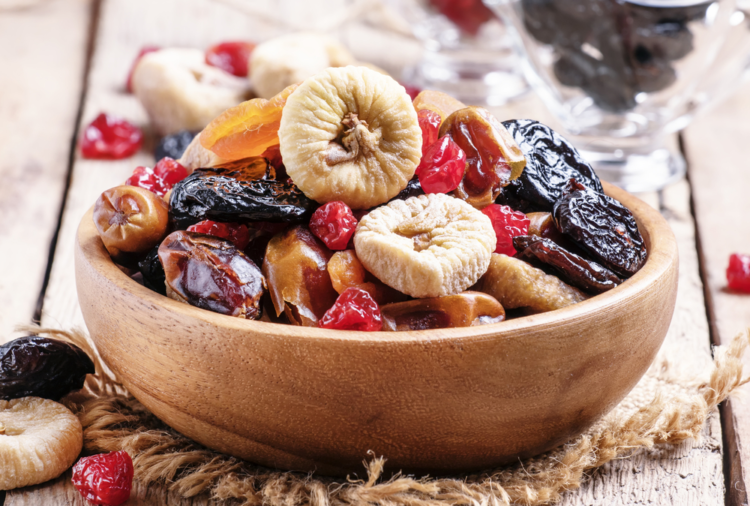Besides fresh fruits, dried fruits are a favourite dish of many people because they are convenient and easy to eat. However, this fruit can be the cause of obesity!
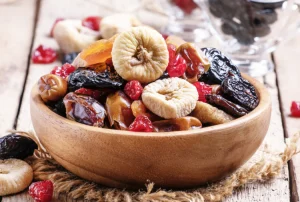
Dried fruit is fruit t that has had almost all of its water removed through drying methods. Other dried fruits that sometimes come in sugar-coated candy form often include mangoes, pineapples, cranberries, bananas, and apples. So is eating dried fruit good? Let’s find out with Hello Bacsi!
Health benefits of dried fruit
Dried fruits can provide many health benefits:
1. Dried fruits contain many nutrients
Dried fruits are high in nutrients. One piece of dried fruit contains the same amount of nutrients as fresh fruit but is concentrated in a small package size. By weight, dried fruit contains up to 3.5 times more fibrefibre, vitamins and minerals than fresh fruit. Therefore, one serving can provide a large proportion of the daily intake of many vitamins and minerals, such as folate.
Dried fruits often contain a lot of fiber and are a good source of antioxidants, especially polyphenols. Polyphenol antioxidants are linked to health benefits such as improved blood flow, better digestive health, reduced oxidative damage, and reduced risk of many diseases. With some exceptions, vitamin C content can be significantly reduced when fruit is dried.
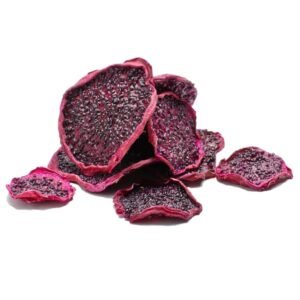
2. Raisins help reduce the risk of some diseases
Raisins are dried fruit that contains fibre, potassium and health-promoting plant compounds. Raisins have a low to moderate glycemic index (GI) value and a low insulin index. This means that eating raisins does not cause large spikes in blood sugar or insulin after meals. Studies show that raisins can provide several health benefits such as:
- Lower blood pressure
- Increase feeling of fullness
- Improved blood sugar control
- Reduces inflammatory markers and blood cholesterol
- Raisins can be one of the safe dried fruits for people with type 2 diabetes and heart disease if eaten in moderate doses.
3. Prunes can help you prevent constipation
Prunes are a very nutritious dried fruit, rich in fibrefibre, potassium, beta-carotene (vitamin A) and vitamin K. Prunes are known for their natural laxative effects thanks to their high fiber content and a sugar alcohol called sorbitol. Prunes are considered even more effective in relieving constipation than psyllium, a fibre-containing constipation medicine.
Prunes also contain many antioxidants that can inhibit the oxidation of LDL cholesterol and help prevent heart disease and cancer. Prunes are also rich in the natural mineral boron, which can help fight osteoporosis. Furthermore, eating plums does not cause a spike in blood sugar levels
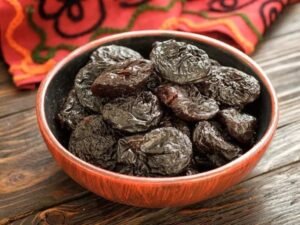
4. Dried dates can be good for pregnant women’s health
Dried dates have a sweet taste and are high in fibre, potassium, iron and several plant compounds. Among all dried fruits, dried dates are one of the richest sources of antioxidants, which contribute to reducing oxidative damage in the body. Dried dates have a low glycemic index, so they do not cause large spikes in blood sugar.
Dates have been researched to benefit pregnant and labouring women. Eating dates regularly during the last few weeks of pregnancy can help facilitate dilation of the cervix, as well as reduce false labour attacks. Dates have also been discovered in animals and test tubes to show that they can treat infertility in men, but this research currently does not have much basis to verify.
Dried fruit brings many health benefits thanks to its high nutritional content, but you should not eat too much to avoid harmful health effects.
Harmful effects of dried fruit you should pay attention to
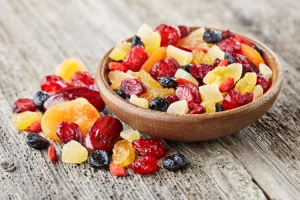
Besides the benefits, dried fruit can cause some of the following negative health effects:
Dried fruit contains a lot of natural sugar
Dried fruit contains a significant amount of natural sugar. Because the water has been removed from dried fruit, the amount of sugar and calories increases with weight. For this reason, dried fruit is higher in calories and sugar than fresh fruit, including glucose and fructose. Below is the natural sugar content of some dried fruits:
- Dried apricots: 53%
- Raisins: 59%
- Dried plums: 38%
- Dried figs: 48%
- Dried dates: 64 – 66%
About 22 – 51% of this sugar content is fructose. Eating a lot of fructose can have negative health effects including increased risk of weight gain, type 2 diabetes and heart disease. To make some dried fruits sweeter and more appealing, manufacturers sometimes coat them with sugar or syrup before drying, also known as “candied” fruit. Added sugar is potentially harmful to your health, increasing your risk of obesity, heart disease and even cancer.
Dried fruit has a sweet taste, so it’s easy to eat too much, which can lead to excess sugar and calories. To avoid using dried fruits that contain a lot of sugar, you need to carefully read the ingredients and nutritional information on the packaging.
Dried fruit may contain toxic compounds
Some manufacturers add preservatives called sulfites to dried fruit to make the dried fruit look more appealing, preventing discolourationcoloured, especially brightly colored fruits like apricots and raisins.
Some people who are sensitive to sulfites may experience stomach pain, skin rashes, and asthma attacks after eating them. To avoid eating sulfites, you should not choose dried fruits with bright, vibrant colours. Besides, if dried fruit is improperly stored and handled, it can also be contaminated with fungi, aflatoxin and other toxic compounds that are harmful to your health.
Thus, dried fruit also has advantages and disadvantages depending on how much you eat and the quality of the food. Although dried fruit provides fibre, antioxidants and nutrients that are good for the body, remember to use it in moderation to avoid affecting your health!
To order fruit at the best price, please contact:
VLUX VIETNAM IMPORT EXPORT COMPANY LIMITED
Email: info@vluxexim.com/ hienchi.vlux@gmail.com
Website: vluxexim.com
Address: No. 58A Vo Van Dung Street, O Cho Dua Ward, Dong Da District, Hanoi City, Vietnam.
Mobile/Whatsapp/Wechat: +84 812 887 858
VLUX VIETNAM IMPORT EXPORT COMPANY LIMITED
Email: info@vluxexim.com/ hienchi.vlux@gmail.com
Website: vluxexim.com
Address: No. 58A Vo Van Dung Street, O Cho Dua Ward, Dong Da District, Hanoi City, Vietnam.
Mobile/Whatsapp/Wechat: +84 812 887 858


